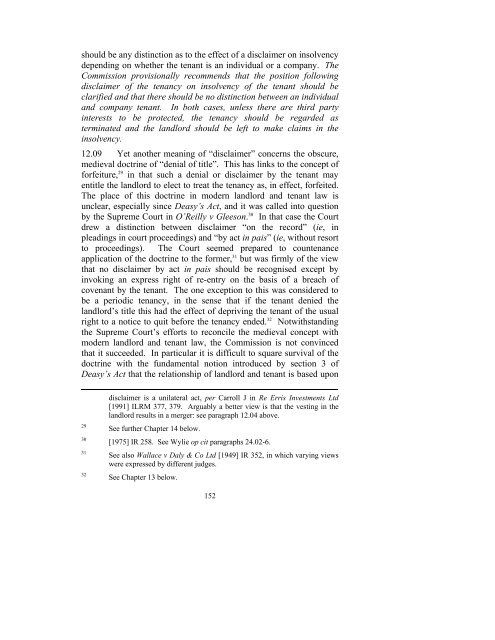Consultation Paper on the General Law of the Landlord and Tenant
Consultation Paper on the General Law of the Landlord and Tenant
Consultation Paper on the General Law of the Landlord and Tenant
Create successful ePaper yourself
Turn your PDF publications into a flip-book with our unique Google optimized e-Paper software.
should be any distincti<strong>on</strong> as to <strong>the</strong> effect <strong>of</strong> a disclaimer <strong>on</strong> insolvencydepending <strong>on</strong> whe<strong>the</strong>r <strong>the</strong> tenant is an individual or a company. TheCommissi<strong>on</strong> provisi<strong>on</strong>ally recommends that <strong>the</strong> positi<strong>on</strong> followingdisclaimer <strong>of</strong> <strong>the</strong> tenancy <strong>on</strong> insolvency <strong>of</strong> <strong>the</strong> tenant should beclarified <strong>and</strong> that <strong>the</strong>re should be no distincti<strong>on</strong> between an individual<strong>and</strong> company tenant. In both cases, unless <strong>the</strong>re are third partyinterests to be protected, <strong>the</strong> tenancy should be regarded asterminated <strong>and</strong> <strong>the</strong> l<strong>and</strong>lord should be left to make claims in <strong>the</strong>insolvency.12.09 Yet ano<strong>the</strong>r meaning <strong>of</strong> “disclaimer” c<strong>on</strong>cerns <strong>the</strong> obscure,medieval doctrine <strong>of</strong> “denial <strong>of</strong> title”. This has links to <strong>the</strong> c<strong>on</strong>cept <strong>of</strong>forfeiture, 29 in that such a denial or disclaimer by <strong>the</strong> tenant mayentitle <strong>the</strong> l<strong>and</strong>lord to elect to treat <strong>the</strong> tenancy as, in effect, forfeited.The place <strong>of</strong> this doctrine in modern l<strong>and</strong>lord <strong>and</strong> tenant law isunclear, especially since Deasy’s Act, <strong>and</strong> it was called into questi<strong>on</strong>by <strong>the</strong> Supreme Court in O’Reilly v Glees<strong>on</strong>. 30 In that case <strong>the</strong> Courtdrew a distincti<strong>on</strong> between disclaimer “<strong>on</strong> <strong>the</strong> record” (ie, inpleadings in court proceedings) <strong>and</strong> “by act in pais” (ie, without resortto proceedings). The Court seemed prepared to countenanceapplicati<strong>on</strong> <strong>of</strong> <strong>the</strong> doctrine to <strong>the</strong> former, 31 but was firmly <strong>of</strong> <strong>the</strong> viewthat no disclaimer by act in pais should be recognised except byinvoking an express right <strong>of</strong> re-entry <strong>on</strong> <strong>the</strong> basis <strong>of</strong> a breach <strong>of</strong>covenant by <strong>the</strong> tenant. The <strong>on</strong>e excepti<strong>on</strong> to this was c<strong>on</strong>sidered tobe a periodic tenancy, in <strong>the</strong> sense that if <strong>the</strong> tenant denied <strong>the</strong>l<strong>and</strong>lord’s title this had <strong>the</strong> effect <strong>of</strong> depriving <strong>the</strong> tenant <strong>of</strong> <strong>the</strong> usualright to a notice to quit before <strong>the</strong> tenancy ended. 32 Notwithst<strong>and</strong>ing<strong>the</strong> Supreme Court’s efforts to rec<strong>on</strong>cile <strong>the</strong> medieval c<strong>on</strong>cept withmodern l<strong>and</strong>lord <strong>and</strong> tenant law, <strong>the</strong> Commissi<strong>on</strong> is not c<strong>on</strong>vincedthat it succeeded. In particular it is difficult to square survival <strong>of</strong> <strong>the</strong>doctrine with <strong>the</strong> fundamental noti<strong>on</strong> introduced by secti<strong>on</strong> 3 <strong>of</strong>Deasy’s Act that <strong>the</strong> relati<strong>on</strong>ship <strong>of</strong> l<strong>and</strong>lord <strong>and</strong> tenant is based up<strong>on</strong>29303132disclaimer is a unilateral act, per Carroll J in Re Erris Investments Ltd[1991] ILRM 377, 379. Arguably a better view is that <strong>the</strong> vesting in <strong>the</strong>l<strong>and</strong>lord results in a merger: see paragraph 12.04 above.See fur<strong>the</strong>r Chapter 14 below.[1975] IR 258. See Wylie op cit paragraphs 24.02-6.See also Wallace v Daly & Co Ltd [1949] IR 352, in which varying viewswere expressed by different judges.See Chapter 13 below.152
















